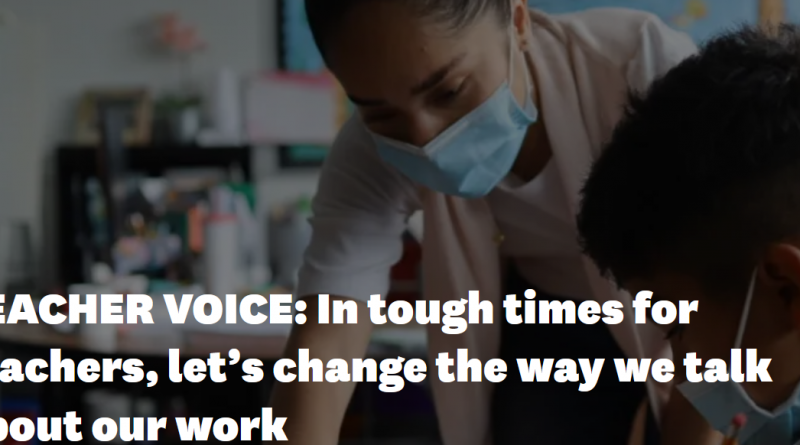TEACHER VOICE: In tough times for teachers, let’s change the way we talk about our work
At a cookout this summer, after I shared yet another story about teaching, a friend of mine said to me: “I could never be a teacher. I couldn’t do what you do.”
I put a humble face on but beamed with pride inside. I couldn’t help it. As a teacher, it’s validating to hear someone else recognize how challenging our work can be, especially looking in from the outside.
But admiration of our craft is not enough. I teach middle school in Indiana, and when schools started back up, there were over 2,000 vacant teaching positions across the state. A month in, only a quarter of those spots had been filled.
Many schools were missing principals and assistant principals, and there were likely hundreds of student support roles beyond the classroom still open. The school staffing shortage is a nationwide issue, and these numbers are concerning for anyone who cares about kids.
How can we manage if this doesn’t get better? Will we combine classrooms in the gym, with one teacher teaching 80 students? Or have students come in two shifts with teachers working 14-hour days on rotation?
I ask these questions knowing that just outside our school walls, thousands of caring, talented people could become amazing educators if they just gave it a shot. Yet teaching scares a lot of people away.
Truly, it may not be for everyone. But I’ve run out of fingers to count the number of teachers I know who switched from another career. Doctors, lawyers, flight attendants, chemists, entrepreneurs, ministers, engineers, authors, and astrophysicists. They’ve all surprised themselves by falling in love with education.
We need to advocate for our profession and invite new folks in, both for our students and for ourselves. We need to talk about what we love about our job, what brings us joy and fulfillment.
Many things outside our control contribute to the nationwide teacher shortage — inadequate pay, dwindling enrollment in education colleges, and burnout. And many districts and states are working on solutions to them.
But teachers, there’s one thing we can do to help that’s in our control: We can change the way we talk about teaching.
We’ve spent a lot of time talking about how challenging the work is. And that’s good. New teachers should know what they’re getting into. And teachers have accomplished a lot by sharing the challenges we face as we advocate for the resources, compensation, leadership, policies, and systems needed to serve students and families the way they deserve.
But are we scaring away people who could be amazing educators? People who could be down the hall from us, on our teams, making our schools stronger?
Each one of us has hundreds of anecdotes, both hilarious and heartwarming, that we can tell to explain why we teach. How often do we choose to share what the job is like at its best?
We need to advocate for our profession and invite new folks in, both for our students and ourselves. We need to talk about what we love about our job and what brings us joy and fulfillment.
Some of my joyful moments: When the popular girls saw a new student working alone and invited her to join their group — now they work together in every class. When two of my students got so excited about earth science that they spent the weekend looking for fossils among the landscaping rocks outside their apartment building and brought them into school to share on Monday. When a student pulled me aside in the hallway and said, “Mr. Shah, let me teach you some of the new slang so the kids won’t make fun of you for being old.”
We need to give people who’ve thought about teaching a complete picture of what they can expect — the rewards alongside the challenges — if we want more people to join us. We have to if we want allies in work and if we want to provide students with the robust and diverse teaching staff they deserve.
Talking about what we love about our work goes beyond bringing in fresh faces and ideas. It’s also good for our mental health. Stepping back and reminding ourselves of the experiences that bring us joy and fulfillment in the day-to-day of teaching is one of the most powerful forms of renewal in the face of burnout. And it’s something I lost sight of during the pandemic. I know I’m not alone in that.
If I could go back to that conversation at the cookout, I would tell my friend what I love about my job.
I love working with students. They’re curious and energizing, and restore my faith in humanity with how they support each other. I love learning something new every day and thinking creatively about how to communicate complex ideas in hands-on, kid-friendly ways. I love collaborating with passionate, hardworking teammates with the same vision for our students. And I know that as I gain experience, I can set better work-life boundaries and get more freedom to use my summer breaks however I want to, from developing myself professionally to spending time with family, traveling, volunteering, or working on side hustles.
When someone says, “I could never be a teacher,” we need to ask them, “Why?” And we need to say, “Come watch me teach.”
By sharing stories of what’s possible and inviting others to see the work we do, we help them see themselves in the shoes of a teacher. And they may just choose to join us in work.
Source: https://hechingerreport.org/teacher-voice-in-tough-times-for-teachers-lets-change-the-way-we-talk-about-our-work/




